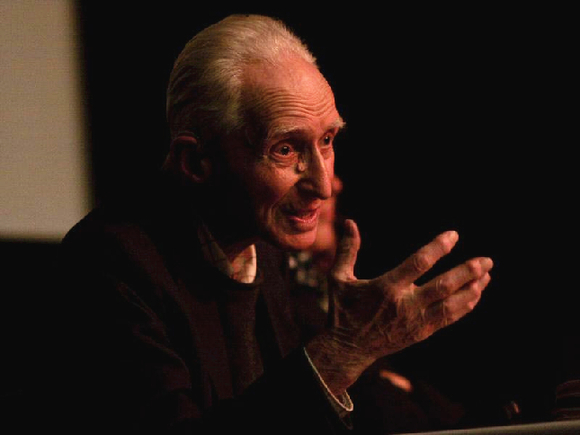Theodor Bergmann: A revolutionary communist since 1927
- By Heiko Khoo
 0 Comment(s)
0 Comment(s) Print
Print E-mail China.org.cn, March 17, 2014
E-mail China.org.cn, March 17, 2014
Theodor Bergmann is probably the longest-standing communist activist in the world. Born in 1916 in Germany, he joined the German Communist Party's Spartakist youth organization in 1927 at 11 years of age and is currently a member of the German Left Party. The 98-year-old spoke at a meeting on the "Condition of the Working Class in China" held in Vienna, Austria, on Feb. 22, 2014. Prominent figures from the Austrian socialist and communist movement were present.
|
|
|
Theodor Bergmann [Photo courtesy Klaus Peter Wittemann www.kpw-photo.com] |
Theodor visited China frequently after 1978 and he continues to carefully follow economic and political developments there. Listening to his clear and lucid speech is to hear the voice of living history. His statements were bold and controversial. He argued that China's economic reforms do not signify the restoration of capitalism, which is currently the consensus view in leftwing and in academic circles in the West. Instead, he explained that China's reforms represent a necessary policy to accumulate state capital. He drew an analogy with the New Economic Policy (NEP) launched in 1921 by Vladimir Lenin, the leader of the Russian Revolution. He explained that Lenin did not consider the NEP to be simply "a retreat" from more radical policies. Rather, Lenin came to view: learning from capitalism, exploiting market dynamics, and using private investment, as long-term measures needed in order to accumulate the economic resources for socialist development.
Theodor is keen on the ideas of Liu Shaoqi, China's head of state from 1959-1968. He arranged the publication of Liu Shaoqi's Selected Works in German 1982 and met with his widow shortly after these books were published.
Theodor joined the German Communist Party in Berlin but he rapidly became aware of problems with party policies towards Adolf Hitler's Nazi Party. He joined the Communist Party Opposition in 1928, because Josef Stalin, the then Soviet leader, adopted a policy of forced collectivization in the USSR and simultaneously compelled communist parties around the world to pursue ultra-left policies. This so-called "Third Period" isolated communists from sympathetic workers in reformist organizations like the German Social-Democrats. The Nazis exploited divisions within the workers' movement and assumed state power in January 1933. This led to the crushing of the German Communist Party -- the strongest communist party outside of the USSR. The Nazis sent the police to arrest Theodor. He escaped the same day. He left Germany and arrived in Palestine where he worked as an agricultural worker in a Kibbutz.







Go to Forum >>0 Comment(s)